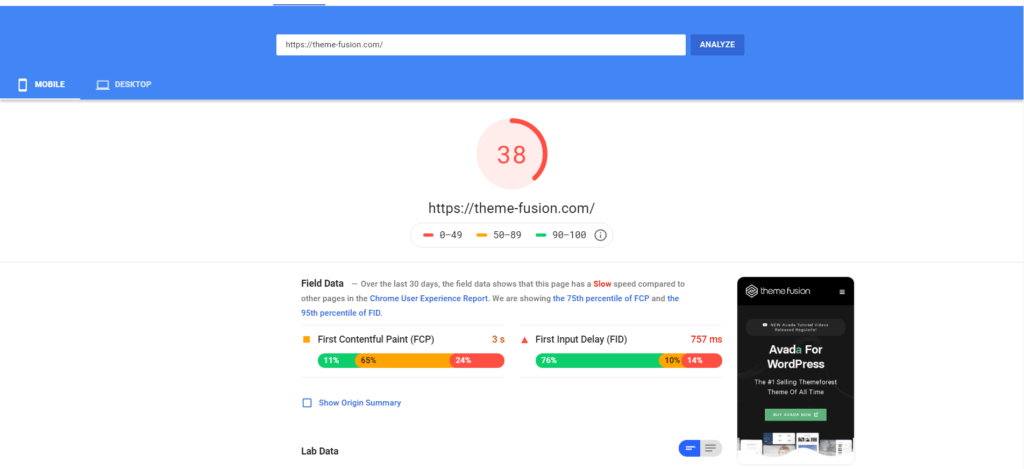Is Google Page Speed Insights used to determine your rank in Google search results?
This question comes up quite often and the answer is a bit nuanced. The short answer is page speed does influence your rank in Google search, but your Google Page Speed Insights score does not influence your rank.
Google Search Console Data
Something that always gets pointed out, is that Google Search Console now includes a “speed” metric under the enhancements section. A common misconception is that this data comes from Page Speed Insights. It does not. The data in Search Console actually originates from CRUX. CRUX or Chrome User Experience Report collects data about how your page loads from visitors on your website. This data uses measurements from your visitors and collects it quite randomly.
Part of the issue in this report, is website’s that tend to get minimal traffic might only be collecting data from the webmaster. The webmaster is typically logged in and is served a slower version (a more dynamic version) of the website. This can lead you to believe all users are experiencing a slow website.
On larger websites, more data is collected and therefore this becomes less of an issue. However, this data is not collected using Page Speed Insights.
Google Product Forums Answer
There has been an answer on Google’s Product Forums regarding the impact of Page Speed Insights on ranking you can read here, but I will quote the gist of it below.
Well Page Speed Insights is not used for ‘ranking’ at all! Its a self contained testing tool. (drawing data from a variety of sources!) Unless the site is really slow, the exact speed is not a ranking factor. Just that users generally like faster sites. See also: https://webmasters.googleblog.com/2018/01/using-page-speed-in-mobile-search.html
Barry Hunter
There is no direct relationship between Page Speed Insights score and your website’s position in search.
They are Maintained By Different Teams
Google has several page speed tools they have developed both internally and those they have released for the web. Some of their web based tools include the following.
- https://web.dev/measure/
- https://www.thinkwithgoogle.com/feature/testmysite/
- https://developers.google.com/speed/pagespeed/insights/
- Lighthouse (Google Chrome).
Here’s the kicker though, almost all of them are based on Lighthouse and they are all using different versions. Page Speed Insights, in fact, has its own scoring guide different from the other tools. ThinkWithGoogle might be using it’s own testing logic as well since it’s just “fast” or “slow”.
In addition, there is a new version of Lighthouse under active development (Version 6) that removes many of the existing scoring metrics and replaces them with new metrics. It also changes its scoring guide again. What’s great is most of these sites are maintained by different teams within Google’s organization and just incorporate the Lighthouse team’s tool into their project.
High Page Speed Insights Scores Require Compromise (or Cheating)
Getting a high Page Speed Insights score requires your site to have been built from the ground up with Page Speed in mind. Google’s common suggestions include the following bullet points pertaining to getting a fast page.
- Reduce your page size (best practice: less than 500KB for a page AND all its resources).
- Limit the number of page resources to 50 for the best performance on mobile.
- Consider using AMP, which almost guarantees fast page loading on both mobile and desktop.
You would also need to minimize most, if not all third-party services and avoid carousels, sliders and other complex page elements. While AMP can help, it helps by effectively removing all of those services anyways and most of the time breaks your design.
There are some services going around claiming they can guarantee a 90+ on Page Speed Insights. Most of these services are manipulating the system solely to get around the performance test. One of those services I mentioned in the below Twitter thread.
The TLDR of the analysis I did, was I found is that they were deferring the loading of the JS until after the test stopped measuring (typically tests stop 2 seconds of no network activity). This means that none of the JavaScript was being measured because Ezoic was not loading the JavaScript until after “X” amount of time and the JavaScript never got measured in the first place.
This practice is becoming quite common because clients want to score high on Page Speed Insights to obtain the illusion of a fast performing website. However, the simple reality is you can’t, unless you’re making cuts. The above website has strange loading behaviors. For example, their menu isn’t accessible and many JavaScript functions simply don’t work until their “work around” loads their JavaScript in, causing a disjointed user experience.
Fast Performing Websites Are Built With Speed In Mind
You can’t have a complicated website filled with sliders, mega menus, 100+ images, advertisements and more and expect it to compare to my website which only loads about 300KB of data on the homepage on initial load.
Now, you can still improve your website’s load time by having a professional tweak your existing install. Going through and fixing glaring performance issues, moving to a faster host, optimizing your stack, and more can result in faster Page Speed Insights scores, and much faster real world experiences.
But if you have a complicated Divi or Avada based website and you’re scoring in the 60’s or 70’s rest assured that you’re in good company.
To End… A collection of popular and slow page speed insights website.



As you can see, websites from all over the web suffer from low Page Speed Insights scores. I don’t think anyone has opened up the Elegant Themes or Theme-Fusion websites and thought they were slow. CNN… well maybe a little with all those advertisements.


Very helpful insight (and you’ve saved me some time)! Appreciated!